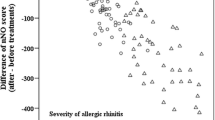Abstract
To evaluate the change in the voice quality of patients with allergic rhinitis (AR) after medical treatment. The study enrolled 69 subjects: 39 with high serum-specific IgE levels to inhalant allergens as the study group and 30 healthy individuals as controls. All patients were evaluated using the total nasal symptom score (TNSS) and voice handicap index-10 (VHI-10) and then underwent an acoustic voice analysis. After 1 month of treatment with mometasone furoate nasal spray (two 50-μg puffs in each nostril once daily) and desloratadine (5-mg tablet once daily), the patients repeated the surveys and acoustic voice analysis. The results before and after treatment were compared. The TNSS and VHI-10 scores decreased significantly after treatment (p < 0.01). After treatment, the acoustic analysis parameters improved significantly and were similar to the control group, and the maximum phonation time increased significantly (p < 0.05). The voice quality of patients with AR is improved with medical treatment.

Similar content being viewed by others
References
Spiegel JR, Hawkshaw M, Sataloff RT (1991) Allergy. In: Sataloff RT (ed) Professional voice: the science and art of clinical care. Raven, New York, pp 153–157
Jackson-Menaldi CA, Dzul Al, Holland RW (1997) Allergies and vocal fold edema: a preliminary report. J Voice 11:138–143
Spiegel JR, Satalof RT, Emerich KA (1997) The young adult voice. J Voice 11:138–143
Corey JP, Gungor A, Karnell M (1998) Allergy for the laryngologist. Otolaryngol Clin North Am 31:189–205
Busquet J, Van Cauwenberger P, Khaltaev N (2001) Allergic rhinitis and its impact on asthma. J Allergy Clin Immunol 108(Suppl. 5):S147–S334
Skoner DP (2001) Allergic rhinitis: definition, epidemiology, pathophysiology, detection and diagnosis. J Allergy Clin Immunol 108(Suppl 1):S2–S8
Bloebaum R (2002) Managing allergic rhinitis: the role of pharmacotherapy; sound treatment can improve your patient’s quality of life. J Respir Dis 23:370–376
Settipane RA (2003) Rhinitis: a dose of epidemiological reality. Allergy Asthma Proc 24:147–154
Reidy PM, Dworkin JP, Krouse JH (2003) Laryngeal effects of antigen stimulation challenge with perennial allergen Dermatophagoides pteronyssinus. Otolaryngol Head Neck Surg 128:455–462
Rosen CA, Lee AS, Osborne J, Zullo T, Murry T (2004) Development and validation of the voice handicap index-10. Laryngoscope 114:1549–1556
Doğan M, Eryüksel E, Kocak I, Celikel T, Sehitoglu MA (2005) Subjective and objective evaluation of voice quality in patients with asthma. J Voice 21:224–230
Millqvist E, Bende M, Brynnel M, Johansson I, Kappel S, Ohlsson A (2006) Voice change in seasonal allergic rhinitis. J Voice 22:512–515
Nathan RA (2007) The burden of allergic rhinitis. Allergy Asthma Proc 28:3–9
Simberg S, Sala E, Tuomainen J, Rönnemaa A (2007) Vocal symptoms and allergy—a pilot study. J Voice 23:136–139
Kaiser HB, Naclerio RM, Given J, Toler T, Ellsworth A, Philpot EE (2007) Fluticasone furoate nasal spray: a single treatment option for the symptoms of seasonal allergic rhinitis. J Allergy Clin Immunol 119(6):1430–1438
Kiliç MA, Okur E, Yildirim İ, Öğüt F, Denizoğlu İ, Kizilay A. (2007) Ses Handikap Endeksi (Voice Handicap Index) Türkçe versiyonunun güvenilirliği ve geçerliliği. In: 29. Türk Ulusal Otolaringoloji ve Baş Boyun Cerrahisi Kongresi Bildiri Özet Kitabi; 26-31 Mayis, 2007; Antalya, Türkiye. İstanbul: Ayhan Matbaacilik s. 23–24
Bousquet J, Khaltaev N, Cruz AA et al (2008) Allergic rhinitis and its impact on asthma. Eur J Allergy Clin Immunol 63(Suppl 86):8–160
Salapatek A, Nelson V, McCue S, Patel P (2009) Assessment of total nasal symptom score (TNSS) during the validation of a novel aerosolized cat dander environmental exposure chamber (EEC) clinical model. Am J Respir Crit Care Med 179:A5704
Krouse JH, Altman KW (2010) Rhinogenic laryngitis, cough and the unified airway. Otolaryngol Clin N Am 43:111–121
Author information
Authors and Affiliations
Corresponding author
Rights and permissions
About this article
Cite this article
Develioglu, O.N., Paltura, C., Koleli, H. et al. The Effect of Medical Treatment on Voice Quality in Allergic Rhinitis. Indian J Otolaryngol Head Neck Surg 65 (Suppl 2), 426–430 (2013). https://doi.org/10.1007/s12070-013-0639-5
Received:
Accepted:
Published:
Issue Date:
DOI: https://doi.org/10.1007/s12070-013-0639-5




